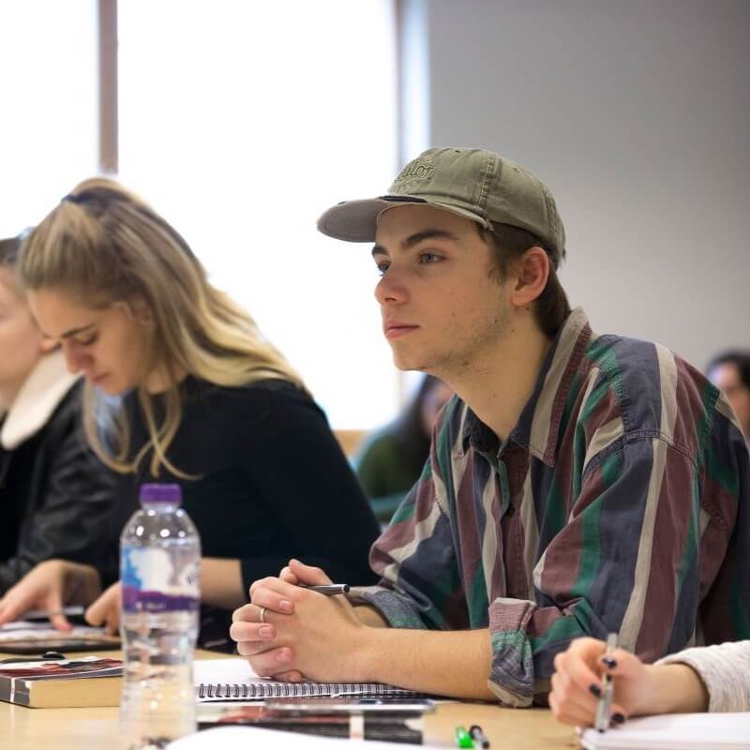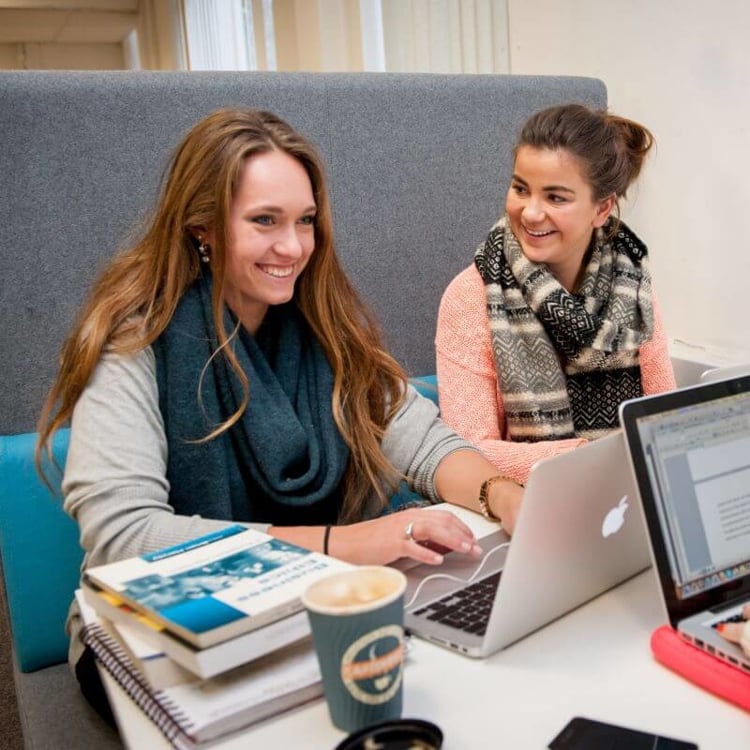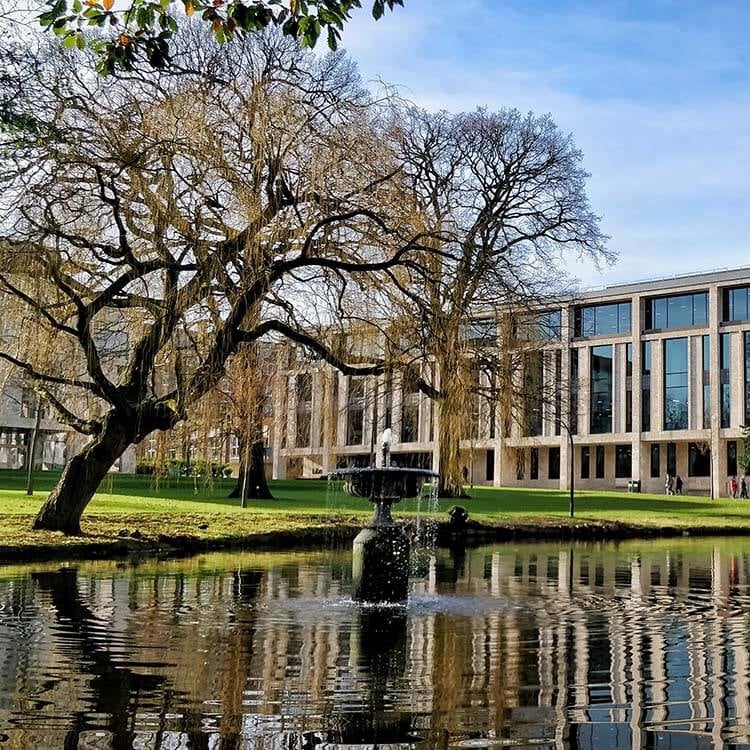/ Undergraduate /
Start date:
September 2025
Entry tariff:
112–128 UCAS points (or equivalent)
Foundation Year: 64–80 UCAS points (or equivalent)
UCAS Code:
PQ53
PQ54 (If choosing Foundation Year)

On-Campus Open Day
Saturday 12 July 2025
Dive into the world of literature and journalism while developing valuable professional skills. This course will teach you how to read critically, write persuasively, and create content that makes an impact.
Did you know?
Roehampton has been ranked 5th best in London for English (The Guardian League Table 2024).
1st in London for Learning Resources in English Literature (National Student Survey 2024).
Our Journalism programme is accredited by the industry professional body The Professional Publishers Association (PPA)!

Top 3 modern university in London
(Complete University Guide 2025)

Ranked in the top 15% in the world
Times Higher Education Young University Rankings 2024

#8 in England for undergraduate student satisfaction
National Student Survey 2024

Foundation Year
This course can also be studied with a foundation year (September entry only).
Modules
This course offers all students the option of a one-year paid work placement, to boost your employability even further. If you choose this route, you will take the placement following year two of your course, and then return to complete your degree.
Why take a placement?
A placement year is the perfect opportunity to gain valuable work experience, to build on the career skills we will teach you on this degree. The connections you make on the placement will improve your career prospects further, and equip you with the skills you need to secure graduate-level employment.
How we support you
The University's Placement and Work Experience Team are experts at helping you to secure a placement. They will work closely with you from the start, helping you research potential employers, discover placement opportunities, create and pitch your CV, and will coach you to perform well in interviews. We aren't able to guarantee a placement, but our sector-leading advisors will give you the best possible chance of securing one.
Find out more about how we'll support you
We understand that your plans might change once you start your programme. If you decide not to do a placement, you will have the option of completing the three year version of your programme.
Whatever your choice, you will have access to many opportunities for work experience through our Placement and Work Experience Team, and access to face-to-face and 24/7 online careers support.
This course offers a foundation year, which takes place at the beginning of your studies. Studying a foundation year will give you academic and practical experience, and a strong introduction to your subject, ensuring you succeed on your undergraduate degree.
30 credits
You will develop your core academic and integrated English language skills of speaking, listening, reading and writing. You will become familiar with key academic skills and concepts, such as referencing methods and awareness of academic integrity and tone. You will apply these skills and knowledge to both broad topics and also your chosen subject pathway.
Teaching and learning
You will be required to actively engage in on-campus learning for up to 10 hours a week.
You will be taught through a full range of teaching and learning methods, which include lectures, seminars, workshops, discussion groups, group directed tasks and presentations. This will enable you to learn from your peers and tutors in both structured and information settings.
You will be encouraged to think creatively about your approach to learning and discussions with your peers. You will also have access to recordings, resources, links and signposting through Moodle to enrich your learning.
Assessment
You will be assessed through group and individual presentations, comparative and reflective essays, multiple choice exams, coursework and reports, oral exams, portfolios, case studies and blogs.
30 credits
You will develop your research, numeracy and information technology skills. You will investigate the difference between primary and secondary research, conduct your own research project and demonstrate your findings through data analysis. You will also develop your awareness of equality, diversion and inclusion in the UK, through a real-world issue; discrimination in the workplace.
Teaching and learning
You will be required to actively engage in on-campus learning for up to 10 hours a week.
You will be taught through a full range of teaching and learning methods, which include lectures, seminars, workshops, discussion groups, group directed tasks and presentations. This will enable you to learn from your peers and tutors in both structured and information settings.
You will be encouraged to think creatively about your approach to learning and discussions with your peers. You will also have access to recordings, resources, links and signposting through Moodle to enrich your learning.
Assessment
You will be assessed through group and individual presentations, comparative and reflective essays, multiple choice exams, coursework and reports, oral exams, portfolios, case studies and blogs.
30 credits
This module supports a broad exploration of crime and law and its integration within society across various sources, which includes diverse cultural, social, and political representations. By analysing a wide range of topics, you are encouraged to critically engage with how disability, gender and race are represented and viewed in relation to crime and law.
This course integrates sustainability by looking at the sustainability of social interactions and your results and consequences in relation to crime and law. Social responsibility, legal injustice across the globe and inequality are all featured. Social Responsibility is embedded through topics such as social identity, prejudice and exclusion. Social Cognitive Theory and Rational Choice Theory helps you understand challenges and question accountability for individuals and communities.
This course fosters global engagement by examining the inequalities experienced in other cultures, particularly in relation to race, gender and exclusion. Global challenges are addressed at every step equipping you with the skills to navigate a globalised world in a variety of ways. By analysing data and text concerning diverse cultures and contexts, you will develop an understanding of how individuals and cultures operate amongst injustices in a globalised world, preparing you to engage thoughtfully with diverse audiences.
Teaching and learning
Through lectures, workshops, group work, and structured academic writing, you will have the opportunity to practice the core academic skills needed for your future studies. Critical thinking will be developed through tasks such as text analysis, group discussions, and the ability to create well-structured academic assignments, including essays and presentations.
The teaching delivery for each module consists of one, one-three-hour lecture and one, two-hour workshop per week. You will get a diverse learning experience through case studies and active learning workshops and microteaches.
You will also have an additional 30 minutes of online support each week, consisting of activities to develop your presentation skills and to provide you with opportunities to explore wider policy implementation in diverse/comparative transnational examples.
Assessment
This module will be assessed using a video presentation and summative essay.
30% - video presentation, working in groups, you will produce a video on a topic taught on the curriculum and explain its impact on UK society, using a real-world example.
70% - summative essay, you will identify an issue, either historical or contemporary, that has had an impact on UK society and connect it to at least one of the key topics covered in the course.
30 credits
This module supports a broad exploration of social understanding across various sources, which includes diverse cultural, social, and political representations. By analysing a wide range of topics, you are encouraged to critically engage with how disability, gender and race are represented and viewed. This ensures that your projects and research can reflect a variation of perspectives, fostering a more inclusive and holistic learning environment.
This course integrates sustainability by looking at the sustainability of social interactions and your results and consequences. Social responsibility, globalisation and inequality are all featured. Social Responsibility is embedded through topics such as social identity, prejudice and exclusion. Social Cognitive Theory and Rational Choice Theory help you understand challenges and question accountability for individuals and communities.
This course fosters global engagement by examining the inequalities experienced in other cultures, particularly in relation to race, gender and class. Global challenges are addressed at every step, equipping you to navigate a globalised world in a variety of ways. By analysing data and text concerning diverse cultures and contexts, you develop an understanding of how individuals and cultures operate in a globalised world, preparing you to engage thoughtfully with diverse audiences.
Teaching and learning
The teaching delivery for each module consists of one, one-three-hour lecture and one, two-hour seminar per week. Lecturers will cover core indicative content, while seminars will consist of research workshops, as well as forming small groups and learning on relevant case studies.
You will also have an additional 30 minutes of online support each week, consisting of activities to develop your presentation skills and to provide you with opportunities to explore wider policy implementation in diverse/comparative transnational examples.
Assessment
This module will be assessed using an academic poster and a summative essay.
40% - academic poster, you will design a poster that provides key information and sociological analysis of your selected story or issue chosen from key weekly topics.
60% - summative essay, you will conduct a sociological analysis of a story or issue you have encountered in the media.
These modules are those we currently offer and may be subject to change.

Skills
Skilling our students for success
Graduate with a broad, transferable range of creative, analytical, and professional skills. This incorporates:
- Being a critical reader of texts and refining your professional reading, editing, and writing skills.
- Developing skills in research and analysis, problem-solving, digital content creation, and independent study.
- Producing features, podcasts and magazines, alongside industry professionals.
This degree prepares you for a variety of roles, where you’ll think critically, communicate complex ideas clearly, and engage with diverse audiences—skills that are increasingly valuable in today’s workplace, especially in the age of AI, which demands creative and critical thinkers.
Want to produce your own zine, podcast, or digital portfolio? You’re in the right place. At Roehampton, you’ll start creating content early on, with expert guidance from professionals. You’ll produce podcasts, features, and, in your final year, a digital magazine or website. One of our previous student-produced magazines even won the prestigious FIPP Rising Star in Media award, beating student magazines from across the globe.
Throughout your journey, you’ll be supported by award-winning magazine editors closely linked to the programme.
Learning
We offer a variety of student-centered teaching methods to suit your learning style.
Join us on our beautiful campus and dive into an inclusive curriculum designed to inspire.
- Experience hands-on, engaging learning that prepares you for a successful career:
- Learn about the exciting world of literature.
Master the art of delivering compelling stories, utilising industry-standard digital tools. - In your final year, you will develop a multimedia magazine or create an audio-visual web project.
Learn through:
- Hands-on workshops, with professionals
- Lectures
- Seminars
- Skills sessions
- Assessment support sessions
- On-site tutorials
Why did our past students study BA English Literature and BA Journalism at the University of Roehampton?
“The reason why I chose to study English literature specifically at Roehampton was down to the teaching staff I met at the time and also the positive feedback I got on open days from other students. The best thing about studying at Roehampton was the support I had from amazing lecturers. Everyone was so approachable and I never felt that I couldn’t just go and knock on a door for help.” - Saara Ismail Mahomed, BA English Literature
“I knew the standard of teaching was very high. The principal reason I chose Roehampton over other London universities […] was that the programme and its component modules sounded infinitely more interesting than programmes and modules offered anywhere else.” - Katherine Farquharson, BA English Literature
"Lecturers are very attentive to what the students need. At the same time, they give you a real sense of what journalism is. In the first year we were assigned to find a public figure to interview. That made a real impact and showed me what the industry would be like." - Vania Caetano Ascensao, Journalism

Assessment
Preparing You for the Future in an Inclusive Learning Environment
You’ll be assessed through a variety of methods, all designed to help you develop practical, real-world skills. This includes:
- Close reading exercises
- Reviews and blog posts
- Essays and interviews
- Media content creation, including:
- Features
- Podcasts
- Videos
- Multimedia packages
- Social media content
- Magazines
Career
The creative and journalistic skills you develop are highly valued by employers, opening doors to diverse career opportunities beyond media.
This degree provides:
- The skills and ideas to teach an English curriculum
- Preparation for careers in print, radio, television, online media, or social media influencing
- A strong understanding of storytelling and press releases essential for roles in: Communications and PR for businesses, charities, political parties, and advocacy groups
Potential career paths you could work as:
- Magazine or web writer
- Editor
- Independent content producer
Many graduates with a Journalism focus also work in:
- Communications
- Public affairs
- Media relations

Wherever you want to go in the future, you’ll be preparing for the world of work from day one at Roehampton, with regular access to:
- Career development events
- Guest industry speakers
- Networking opportunities
- Personalised mentoring and careers support
You’ll graduate ready to grab every opportunity that comes your way.
Our careers support team is available to support you from the start of your studies until after you graduate. We will help you build your CV, prepare for interviews, and meet and learn from successful graduates working at the top of their careers.
You’ll also have opportunities to work with our partners across London and beyond, and to attend a Roehampton jobs fair where you can find out about graduate opportunities and meet employers.
Open days
Get a real taste of our campus, community and what it’s like to study at Roehampton
Applying
Full-time UK undergraduate students apply through UCAS.
Course subject to curriculum review and validation.
Entry tariff
112–128 UCAS points (or equivalent)
Foundation Year: 64–80 UCAS points (or equivalent)
Looking to work out your UCAS points or find out about our entry requirements? Find out more.
When we consider applications to study with us, we form a complete view of your achievements to date, and future potential, and can offer flexibility in entry requirements. Find out more about our Contextual Offer scheme.
General entry requirements
September 2025 entry tuition fees
UK (home) tuition fees
Undergraduate degree: £9,535
Foundation Year: £9,535
We offer a wide range of scholarships and bursaries. See our financial support pages for UK students.
We also provide other ways to support the cost of living, including free buses and on-campus car parking, hardship support and some of the most affordable student accommodation and catering in London. Find out more about how we can support you.
International undergraduate students apply through our direct application system.
Course subject to curriculum review and validation.
Entry tariff
112–128 UCAS points (or equivalent)
Foundation Year: 64–80 UCAS points (or equivalent)
Looking to work out your UCAS points or find out about our entry requirements? Find out more.
When we consider applications to study with us, we form a complete view of your achievements to date, and future potential, and can offer flexibility in entry requirements. Find out more about our Contextual Offer scheme.
General entry requirements
September 2025 entry tuition fees
EU and international tuition fees
Undergraduate degree: £16,950
Foundation Year: £16,950
International Foundation Pathway: £16,950
We offer a wide range of scholarships and bursaries. See our financial support pages for international students.
We also provide other ways to support the cost of living, including free buses and on-campus car parking, hardship support and some of the most affordable student accommodation and catering in London. Find out more about how we can support you.








